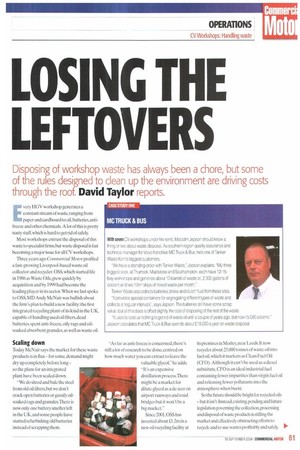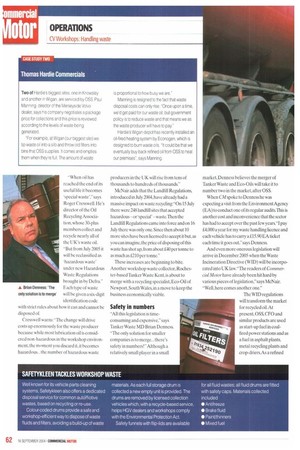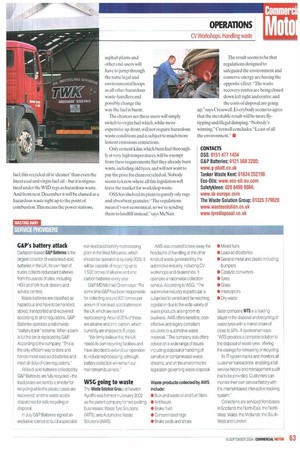LOSING THE LEFTOVERS
Page 63

Page 64

Page 65

If you've noticed an error in this article please click here to report it so we can fix it.
Disposing of workshop waste has always been a chore, but some of the rules designed to clean up the environment are driving costs
through the roof. David Taylor reports.
Every H GV workshop generates a constant stream of waste, ranging from paper and cardboard to oil, batteries, antifreeze and other chemicals. A lot of this is pretty nasty stuff, which is hard to get rid of safely.
Most workshops entrust the disposal of this waste to specialist firms, but waste disposal is fast becoming a major issue for all CV workshops.
Three years ago Commercial Motor profiled a fast-growing Liverpool-based waste oil collector and recycler. OSS, which started life in 1986 as Waste Oils, grew quickly by acquisition and by 1999 had become the leading player in its sector. When we last spoke to OSS, MD Andy McNair was bullish about the firm's plan to build a new facility: the first integrated recycling plant of its kind in the UK, capable of handling used oil filters, dead batteries, spent anti-freeze, oily rags and oilsoaked absorbent granules, as well as waste oil.
Scaling down
Today McNair says the market for these waste products is in flux — for some, demand might dry up completely before long — so the plans for an integrated plant have been scaled down.
"We do shred and bale the steel from old oil filters, but we don't crack open batteries or gassify oilsoaked rags and granules.There is now only one battery smelter left in the UK, and some people have started refurbishing old batteries instead of scrapping them. -As far as anti-freeze is concerned, there's still a lot of research to be done, centred on how much water you can extract to leave the valuable glycol," he adds. "It's an expensive distillation process.There might he a market for dilute glycol as a de-icer on airport runways and road bridges but it won't be a big market."
Since 2001, OSS has invested about f.1 .2m in a new oil recycling facility at its premises in Morley, near Leeds. It now recycles about 25,000 tonnes of waste oil into fuel oil, which it markets as Clean Fuel Oil (CFO). Although it can't be used as a diesel substitute, CFO is an ideal industrial fuel containing fewer impurities than virgin fuel oil and releasing fewer pollutants into the atmosphere when burnt.
So the future should be bright for recycled oils —but it isn't.Instead,existing,pending and future legislation governing the collection, processing and disposal of waste products is stifling the market and effectively obstructing efforts to recycle and re-use wastes profitably and safely. OP A Brian pertness: 'The only solution is to merge' When oil has reached the end of its useful life it becomes 'special waste'." says Roger Cresswell. He's director of the Oil Recycling Association , whose 30-plus members collect and recycle nearly all of the UK's waste oil. "But from July 2005 it will be reclassified as 'hazardous waste' under new Hazardous Waste Regulations brought in by Defra.Each type of waste will be given a six-digit identification code with strict rules about how it can and cannot be disposed of.
Cresswell warns: "The change will drive costs up enormously for the waste producer because while most lubrication oil is considered non-hazardous in the workshop environment, the moment you discard it. it becomes hazardous... the number of hazardous waste producers in the UK will rise from tens of thousands to hundreds of thousands."
McNair adds that the Landfill Regulations, introduced in July 2004, have already had a massive impact on waste recycling:"On 15 July there were NS landfill sites that accepted hazardous —or 'special' — waste. Then the Landfill Regulations came into force and on 16 July there was only one. Since then about 10 more sites have been licensed to accept it but, as you can imagine, the price of disposing of this waste has shot up, from about £40 per tonne to as much as £210 per tonne."
These increases are beginning to bite. Another workshop waste collector, Rochester-based Tanker Waste Kent. is about to merge with a recycling specialist. Eco-Oil of Newport, South Wales, in a move to keep the business economically viable.
Safety in numbers
All this legislation is timeconsuming and expensive," says Tanker Waste MD Brian Denness. "The only solution for smaller companies is to merge... there's safety in numbers!" Although a relatively small player in a small market, Denness believes the merger of Tanker Waste and Eco-Oils will take it to number two in the market, after OSS.
When CM spoke to Denness he was expecting a visit from the Environment Agency (EA) to conduct one of its regular audits.This is another cost and inconvenience that the sector has had to accept over the past few years."! pay £4.000 a year for my waste handling licence and each vehicle has to carry a£15.90 EA ticket each time it goes out," says Denness.
And even more onerous legislation will arrive in December 2005 when the Waste Incineration Directive (WID) will be incorporated into UK law. "The readers of Commercictl Motor have already been hit hard by various pieces of legislation." says McNair. "Well, here comes another one."
The WID regulations will transform the market for recycled oil.At present, OSS, CFO and similar products are used as start-up fuel in coalfired power stations and as a fuel in asphalt plants. metal recycling plants and crop-driers.As a refined fuel, this recycled oil is 'cleaner' than even the finest coal and virgin fuel oil -but it is stigmatised under the WID regs as hazardous waste. And from next December it will be classed as a hazardous waste right up to the point of combustion.This means the power stations, asphalt plants and other end-users will have to jump through the same legal and environmental hoops as all other hazardous waste-handlers and possibly change the way the fuel is burnt.
The chances are these users will simply switch to virgin fuel which, while more expensive up-front, will not require hazardous waste conditions and is subject to much more lenient emissions restrictions.
Only cement kilns, which burn fuel thoroughly at very high temperatures, will be exempt from these requirements But they already bum waste, including old tyres, and will not want to pay the price for clean recycled oil. Nobody seems to know where all this legislation will leave the market for workshop waste.
OSS has shelved its plans to gassify oily rags and absorbent grartules:"The regulations mean it's not economical, so we're sending them to landfill instead," says McNair. The result seems to be that regulations designed to safeguard the environment and conserve energy are having the opposite effect."The waste recovery routes are being closed down left right and centre, and the costs of disposal are going up," says Cresswell. Everybody seems to agree that the inevitable result will be more flytipping and illegal dumping. "Nobody's winning," Creswell concludes.-Least of all the environment." •






































































































































































































